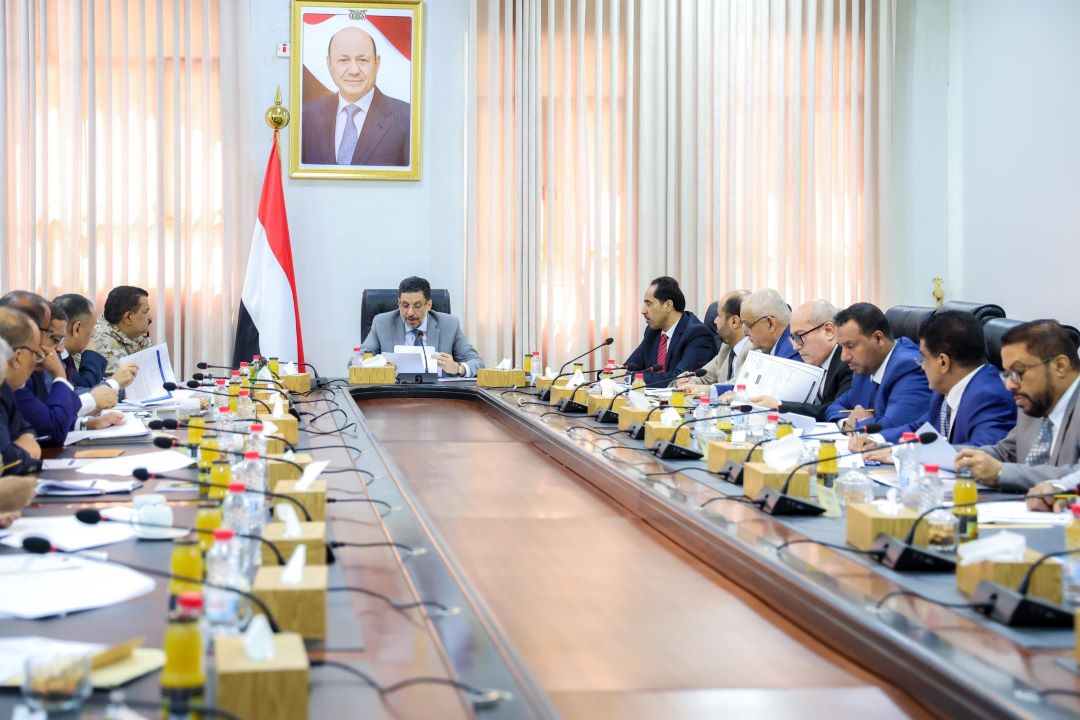Source: Prime Minister’s Office
The Council of Ministers held an exceptional meeting, on Thursday, in the interim capital Aden, chaired by Prime Minister Dr. Ahmed Awad bin Mubarak, dedicated to discussing economic, financial, monetary, service, and livelihood developments. Foremost were currency exchange fluctuations, electricity-related challenges, and evaluating the government’s plans to deal with these issues.
The Council reviewed the draft Economic Rescue Plan, enriching it with discussions and comments for its development and alignment with the ongoing government programs and policies in the area of reforms, as a prelude to its adoption and presentation to the Presidential Leadership Council.
The Council of Ministers conducted an extensive discussion to evaluate the plan, which aligns in many aspects with the government’s main priorities, including completing state recovery, ending the coup, achieving peace, combating corruption, enhancing transparency and accountability, as well as financial and administrative reform, economic resource development, and the optimal utilization of foreign aid and grants according to governmental needs and priorities.
The Council approved the establishment of a ministerial committee, headed by the Minister of Finance, and including ministers of Planning and International Cooperation, Industry and Trade, Electricity and Energy, Transport, Civil Service and Insurance, Oil and Minerals, the Central Bank of Yemen, the General Secretariat of the Council of Ministers, and the Prime Minister’s Office. This committee is tasked with studying the plan, incorporating the provided notes, and re-presenting it to the Council within two weeks for further discussion and necessary actions.
The committee was charged with aligning the plan with the government’s program, reform matrix, economic recovery plan, sectoral plans of the ministries, and other policies under implementation by the government, identifying priorities, what has been accomplished, and the requirements for plan execution, and producing a unified economic document to be relied upon in state and government operations according to urgent priorities. It emphasized identifying challenges in line with reality and changes, and ways to address them appropriately, with shared responsibility and duties between the government and the Presidential Leadership Council.
The discussions among Council members focused on the importance of the plan considering the causes of the catastrophic economic situation exacerbated by the terrorist Houthi militia attacks on oil facilities and international shipping routes, and specifying the support required from Yemen’s development partners among countries and donor organizations. They emphasized identifying the policies implemented, those currently in progress as included in the plan, the challenges and obstacles to their execution, and suggestions for addressing these.
The Council of Ministers was briefed on reports from the concerned ministers regarding the issues in supplying power stations with fuel in the interim capital Aden, the efforts to overcome these issues, and the urgent measures to find solutions for achieving relative stability in electricity services, and ensuring continued water supply for citizens.
In this regard, it was affirmed to provide emergency quantities to the power stations and ongoing efforts to secure additional quantities to ensure service stability.
The Ministers of Water and Electricity were directed to coordinate to secure the operational needs of water wells, including electricity and necessary fuel for continuous pumping, to avoid water supply interruptions for Aden’s residents.
The Council of Ministers listened to briefings on the results of campaigns against non-compliant money exchange shops and currency speculators in Aden and the liberated governorates, and the regulation of commodity prices and those manipulating prices to mitigate the ongoing impacts on citizens’ livelihoods. Emphasis was placed on continuing these campaigns and coordinating between security agencies and judicial authorities in this aspect.

